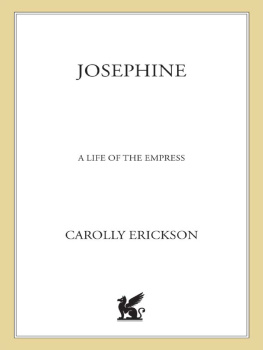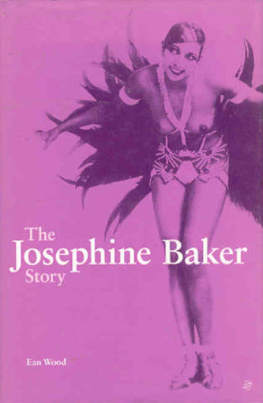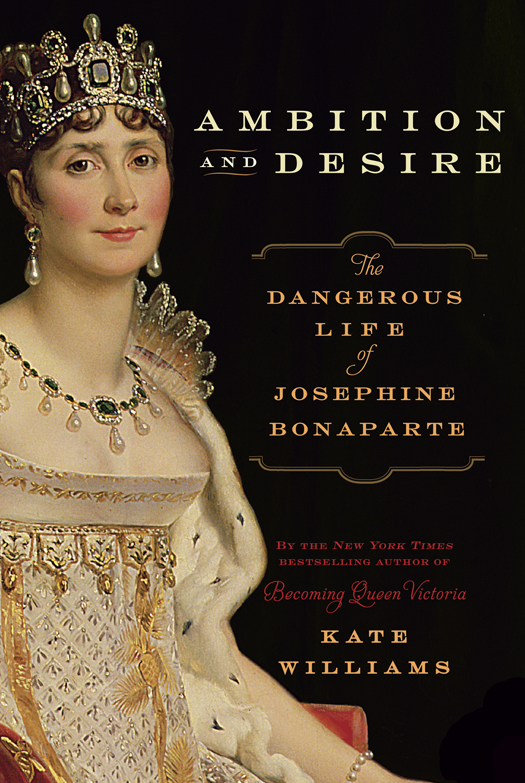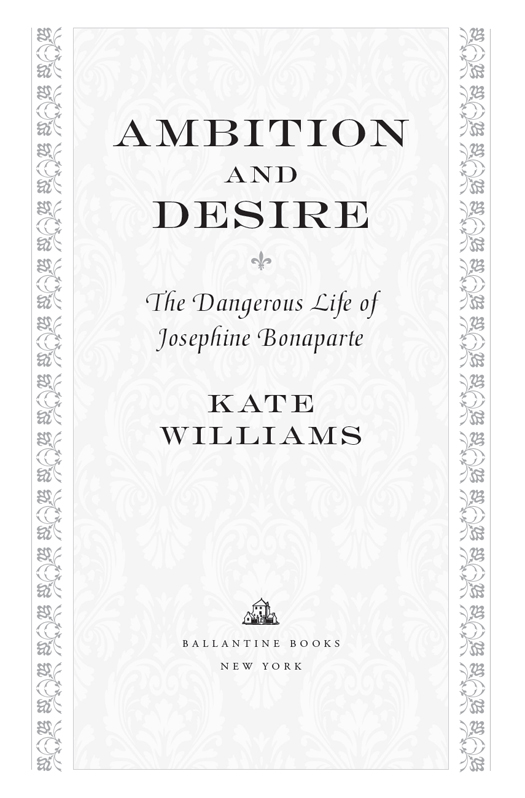Copyright 2014 by Kate Williams
All rights reserved.
Published in the United States by Ballantine Books, an imprint of Random House, a division of Random House LLC, a Penguin Random House Company, New York.
B ALLANTINE and the H OUSE colophon are registered trademarks of Random House LLC.
Originally published in hardcover in the United Kingdom by Hutchinson, a member of The Random House Group Limited, London, in 2013.
Library of Congress Cataloging-in-Publication Data
Williams, Kate
Ambition and desire : the dangerous life of Josephine Bonaparte / Kate Williams.
pages cm
Includes bibliographical references.
ISBN 978-0-345-52283-2
eBook ISBN 978-0-345-52285-6
1. Josephine, Empress, consort of Napoleon I, Emperor of the French, 17631814. 2. Napoleon I, Emperor of the French, 17691821Marriage. 3. EmpressesFrenchBiography. I. Title
DC 216.1. W 44 2015
944.05092dc23
[ B ] 2014030438
www.ballantinebooks.com
Title-page image: copyrightiStock.com / anamad
Jacket design: Marietta Anastassatos
Jacket painting: Franois Pascal Simon, Baron Grard, portrait of Empress Josephine, 1808 (Chteau de Fontainebleau/Giraudon/Bridgeman Art Library)
v3.1
Contents
Prologue
December 1, 1804.
It was the most important night of Josephines life.
Parisians and men and women from all over France were taking their positions along the route in the darkness, dignitaries from across the world had arrived, the gold coaches were prepared, and the imperial robes were hanging ready for the supreme hero. The next day, Napoleon was to be crowned emperor of France and all its territories. The little Corsican soldier would be His Imperial Majesty.
All of France believed Josephine was marvelously happy, but inside the grand palace of the Tuileries, she was afraid. She was about to pull off the most audacious plan of her life.
Everything was riding on how she conducted herself in what would be the most important test of her life so far. If she succeeded, she would be crowned empress, first woman of the empire and the consort of the greatest man the century would see. But if she failed, she would be condemned to disgrace, humiliation, and poverty. She was forty, she had been Napoleons wife for eight years, and he was talking of annulling their marriage.
Napoleon had once been obsessed with his little Creole. But he mourned the lack of an heir, and now that he was the ruler, every woman in the empire was offering herself to him. When Josephine fell into one of her jealous rages, he simply left the room, bored by her tears. And because he had married her in a civil ceremony, she would not be too difficult to put aside.
The Imperial Majesty, so decisive on everything, was unsure about his empress. His family whispered to him that marrying a foreign princess would boost his grandeurand produce an heir. And yet Josephine was very popular with the French people, and Napoleon saw her as his good-luck charm. He was also a deeply loyal man. How can I put away this excellent woman just because I am becoming great? he fretted. Perhaps, he thought, he would wait until after he was crowned.
Then he made one crucial mistake: He confided his concerns to Josephine. She responded calmly. Then she plotted. Pope Pius VII and his entourage were visiting, and Napoleon had asked Josephine to act as hostess. She was a celebrated diplomat, and he was proud of her graceful, charming ways. She seized the opportunity to win Pius over to her side.
B Y D ECEMBER 1, the night before the coronation, Josephine was ready to strike. She begged the pope for a private audience and assumed her prettiest, gentlest manner. She confided to him that she felt quite distraught, violently worried about her soul, and only he could help her. She simply had to tell him her secret: The marriage had been a civil union, so they were living in sin in the eyes of God. She was afraid, she told him, so desperately afraid, that the emperor was destined for hell.
Pius was prompted to action by her tears and softly whispered worries. He marched straight to the emperor and blustered that he refused to crown a sinful man. Declaring himself shocked that His Imperial Majesty had not confessed the truth, he announced that Napoleon must be immediately married in a religious ceremony. Napoleon pleaded and bullied, but Pius would not relent. The imperial pair must be united by a priest or he would refuse to conduct the coronation.
Josephine sat demurely and waited for her plan to succeed. She had lingered until the very last minute to tell Pius, so that Napoleon would not have the time to argue the pope into a compromise. The supreme emperor was forced into a corner. Either he agreed to marry or the coronation would be delayed. Finally, grudgingly, he gave in. A makeshift altar was created in his study, and the couple was secretly married that evening by one of Piuss cardinals. Napoleon fumed, while Josephine smiled.
She had won. She was Napoleons wife before God. It would be almost impossible for him to set her aside. She, the little Creole, would be empress of France.
That night Josephine savored her triumph. She had beaten everybodyNapoleons spiteful family, the politicians who whispered against her, and all the actresses and duchesses who had tried to usurp her. They would all have to watch her be crowned.
A T TEN A.M. on December 2, the imperial coach set out from the Tuileries Palace for Notre-Dame. It was a giant concoction of gleaming gilt, drawn by eight splendid white horses and topped with a magnificent crown borne by four sculpted eagles. Napoleon and Josephine sat resplendent in their sumptuous coronation robes, just visible through the long glass windows. Crowds lined their route, along pavements that seemed to have been sprinkled in gold.
Josephine had never looked more beautiful. She wore a long white satin gown heavily embroidered in gold, and the shining ringlets of her hair were arranged around a fabulous diadem of leaves made from a thousand diamonds and adorned with pearls. Her necklace and earrings were sapphires and emeralds surrounded by cut diamonds, and on her finger she wore a rubythe symbol of joy and so perfect a personification of elegance and majesty.
At Notre-Dame, Napoleon received his crown from the pope. He placed it on his head and then waited as Josephine advanced toward him. She knelt before him and clasped her hands, as if praying to him. Then Napoleon moved toward her and placed the crown on her head, gently, so as not to disturb her priceless diadem.
Josephineimpoverished Creole, widow, semi-courtesan, and mistresswas now empress of all France. She had won.
Or so she thought.
M ARIE -J OSPHE -R OSE DE T ASCHER de La Pagerie grew up a carefree girl on Martinique, became a kept mistress in Paris, and ended as the most powerful woman in France. She was no great beauty, and she was six years older than her husband, but one twitch of her skirt could enthrall the man who terrorized Europe. She became the perfect consort, skilled at pleasing the crowds and reading Napoleons mood all the while. She was soft power to his hard power: She excelled where he could not, as a master of patronage, diplomacy, and etiquette. As a heroine of the Terror and a former aristocrat, she legitimized him in the eyes of the people as a defender of the Republic, and her kindness and gentle manner made people forget his brutality and rudeness.











